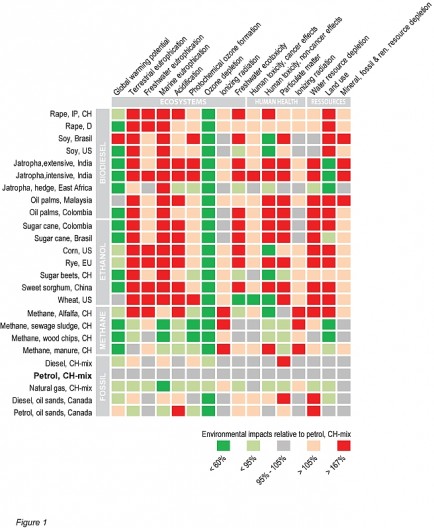
A new study by Swiss research group Empa found that some biofuels, especially the ones made from crops cultivated on deforested land, produce more GHG emissions than petrol (Photo: Shutterstock)
The controversial debate over the sustainability of biofuels has been reignited by new research from Swiss-based research institute Empa. While the study maintains that biofuels can be sustainable depending on certain conditions and the technology involved, the findings suggest that only a few are more environmentally friendly than gasoline.
The study entitled Harmonisation and extension of the bioenergy inventories and assessment was carried out by the Swiss Federal Laboratories for Materials Science and Technology (Empa) in conjunction with the Institute Agroscope Reckenholz-Tänikon (ART), and the Paul Scherrer Institute (PSI). It is an update on a first of its kind report compiled in 2007, made more relevant for the present with new energy plants, manufacturing processes and updated assessment methods. Yet, the researchers arrived at a similar conclusion.
Although biofuels can have a smaller carbon footprint compared with fossil fuels, they produce other types of environmental pollution, including soil acidity and excessive levels of fertilizers finding their way into lakes and rivers.
More alarmingly, biofuels from deforested areas have a bigger greenhouse gas (GHG) footprint than fossil fuels. This is also true of indirect land usage – if existing agricultural land is used for the first time for a biofuel crop, new areas will have to be cleared to make up for displaced food and animal feed crops.
Empa overview of the environmental impacts of various biofuels relative to petrol
“Most biofuels therefore just deflect the environmental impact: fewer greenhouse gases, thus more growth-related pollution for land used for agriculture,” says Empa researcher Rainer Zah.
Biogas made from residues and waste materials performs particularly well in terms of reducing emissions, having up to half the environmental impact of gasoline. Meanwhile, ethanol-based fuels tend to be greener than those biofuels with an oil base. Nevertheless, any environmental advantage or disadvantage is dependent on how the fuel is manufactured and the technology involved.
Besides the methodological updates, the new report also fixed some "weaknesses" of the previous report, where the researchers underestimated how much changes to natural areas, such as the deforestation of the rainforest, impacted on GHG balance.
On a positive note, biofuel crops can increase the carbon content of the soil. As examples, the report cites the cultivation of oil palms on unused grazing land in Colombia or jathopha plantations in India and eastern Africa, where deserted land has been transformed into arable areas. However, the report's authors warn that all these benefits depend on the type of agriculture being practiced and the land’s previous use, with each biofuel type needing to be analyzed individually.
The report also includes some general advice on what to do to avoid the most adverse ecological results from biofuel production. Clearing forests and bush areas is an obvious no-no. In the case of agricultural land, indirect change of land is also bad practice. Finally, second generation biofuels, based on residues such as straw, garden and timber waste can be environmentally sound if they are not being diverted from other uses and if their extraction does not compromise soil fertility and biodiversity.
The report can be downloaded here.
About the Author
Copyright © gizmag 2003 - 2012 To subscribe or visit go to: http://www.gizmag.com

